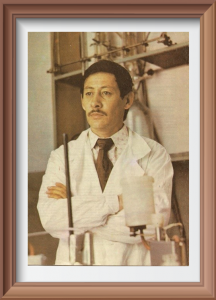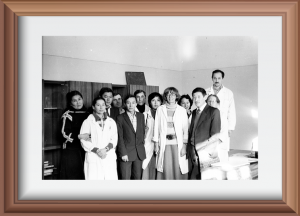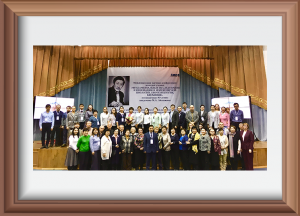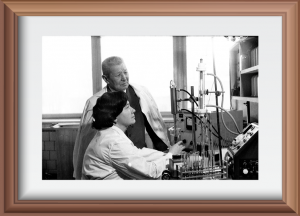M.A. Aitkhozhin Institute of Molecular Biology and Biochemistry at 40th anniversary!
M.A. Aitkhozhin Institute of Molecular Biology and Biochemistry at 40!
February 22, 2023 marks the 40th anniversary of the establishment of M.A. Aitkhozhin Institute of molecular biology and biochemistry.
History of the Institute
The Institute of molecular biology and biochemistry was established by the Decree of the Council of Ministers of the Kazakh SSR No. 83 dated February 22, 1983.
The Institute is rightfully the founder in Kazakhstan of such scientific areas as molecular biology, genetic and cell engineering, molecular genetics and molecular medicine, space biology and biotechnology, molecular immunology and immunobiotechnology, ethno- and paleogenomics.
Many talented scientists were at the origins of the founding of the Institute of molecular biology and biochemistry, but Academician Murat Abenovich Aitkhozhin played a key role in its organization and development.
Even 15 years before the opening of the Institute, at the Department of plant physiology and biochemistry of C.M. Kirov Kazakh state university, molecular biological research was born under the guidance of T. B. Darkanbaev. As rector of the university, he took active steps to train specialists in the field of nucleic acid research. In 1959, for the passage of training and industrial practice at Moscow state university to the outstanding biochemist – the founder of the school on nucleic acids, Academician A.N. Belozersky was sent a third-year student M. Aitkhozhin, where he subsequently defended his thesis. In the same place, M. Aitkhozhin entered for postgraduate study (supervisor A.S. Spirin). In 1962 Bibigul Tulegenova was sent for a one-year internship at the Institute of plant biochemistry of the German academy of sciences to the prominent specialist in nucleic acids, Professor K. Motes. In 1963, Ramziya Azimuratova was sent for postgraduate study to Leningrad state university.
As a result, by 1966-67. Kazakhstan receives the first highly qualified specialists in the field of molecular biology, and in 1968 T.B. Darkanbaev opens a laboratory of biochemistry of protein and nucleic acids at the Institute of botany of the Academy of sciences of the Kazakh SSR, which included candidates of sciences – M.A. Aitkhozhin, B.T. Tulegenova and R.Zh. Azimuratova. A year later, M.A. Aitkhozhin was elected as a head of the same laboratory and was entrusted with all further responsibility for the formation and development of molecular biology in the republic. As its scientific direction, the laboratory determined the study of the structural organization and features of the functioning of ribonucleoprotein particles (mRNP) in a plant cell. By the end of the 1970s, the Laboratory of protein and nucleic acids had made great strides. The results of laboratory research were known not only in the country, but also abroad. For the discovery and study of the functions of mRNP particles in plants, Murat Abenovich was awarded the Lenin Prize of the USSR, and young scientists Khizat Doshchanov, Nikolai Filimonov, Bulat Iskakov were awarded the Komsomol Prize. For the development of instruments for molecular biological and biochemical research, Valery Gross was awarded the Lenin Komsomol Prize of the Kazakh SSR.
In the 70s, Kazakhstan already had its own highly qualified specialists in the field of molecular biology: M.A. Aitkhozhin, A.B. Beklemishev, L.M. Nazarova, H.I. Doshchanov, A.U. Akhanov, N.G. Filimonov, B.K. Iskakov, N.S. Polimbetova, V.Gross. A new school of molecular biologists was established here, which continued to grow and, in the early 1980s, became the recognized center of plant molecular biology in the country.
This was the reason for organizing in 1983 on the basis of a number of laboratories of the Institute of botany a new institution – the Institute of molecular biology and biochemistry as part of the Academy of sciences of the republic. The corresponding resolution of the Council of Ministers of the Kazakh SSR No. 83 was issued on February 22, 1983. M.A. Aitkhozhin was elected as a director of the institute. The Institute was supposed to accelerate the development of physical and chemical biology and biotechnology and the use of their achievements in the national economy.
At that time, the leadership of the Institute identified three main areas of scientific activity. These are studies of the molecular mechanisms of protein biosynthesis and its regulation in the plant organism; development of biochemical bases for improving the quality of grain crops; synthesis and exchange of physiologically active substances and enzymes of plant origin. Laboratories for genetic engineering, transgenesis, and later cell engineering were created.
A year after the establishment of the institute, an international symposium “Perspectives of bioorganic chemistry and molecular biology” was held on its basis. The symposium was attended by Nobel Prize winners – L. Polling and D. Hodgkin, leading scientists in the field of molecular biology and bioorganic chemistry – A.S. Spirin, G.P. Georgiev, Yu.A. Ovchinnikov, V.P. Skulachev.
Thanks to managerial talent and personal authority, Murat Abenovich Aitkhozhin managed to gather a strong team at the Institute. The leaders of the main scientific directions were such well-known scientists as Academician of the Academy of sciences of the Kazakh SSR T.B. Darkanbaev, Corresponding member of the Academy of sciences of Kazakh SSR L.K. Klyshev. Laboratories were equipped with the necessary and ultra-modern equipment. M.A. Aitkhozhin during his leadership was able to bring the authority of the institute to the all-Union level, to nurture a galaxy of talented scientists who continue his work today. In 1988, on the basis of the Decree of the Council of Ministers of the Kazakh SSR, the Institute was named after Academician Murat Abenovich Aitkhozhin.
An invaluable contribution to the period of formation and development of M.A. Aitkhozhin Institute of molecular biology and biochemistry and its recognition at the international level, were made by the following scientists: academician of the Academy of sciences of the Kazakh SSR Darkanbaev B.T., Corresponding member of the Academy of sciences of the Kazakh SSR Klyshev L.K., Academician of the National academy of sciences of the Republic of Kazakhstan Aitkhozhina N.A., Academician of the National academy of sciences of the Republic of Kazakhstan Gilmanov M.K., doctor of biological sciences Iskakov B.K., doctor of biological sciences Karabaev M.K., doctor of biological sciences Belyaev N.N. ., doctor of biological sciences Kunaeva R.M., doctor of biological sciences Fursov O.V., doctor of biological sciences Balmukhanov T.S., candidate of biological sciences Zhardemaly Zh.K. and many others.
Development of the Institute during the independence of Kazakhstan
From 1988 to 2019 M.A. Aitkhozhin Institute of molecular biology and biochemistry was headed by Academician of the National academy of sciences of the Republic of Kazakhstan Nagima Abenovna Aitkhozhina. With her, for the first time in Kazakhstan, a genome laboratory and a laboratory of structural and functional genomics were organized, in which new areas of research were developed, such as the human genome and molecular mechanisms of occurrence and predisposition to hereditary diseases, gene expression, structural and functional organization of the genome of cereal crops, molecular mechanisms of wheat resistance to phytopathogens, entho- and paleogenomics, biological processes in living cells affected by microgravity (space biology and biotechnology). Despite the fact that these were not easy years of the collapse of the USSR, changes and the formation of sovereign Kazakhstan, the institute continued to work and develop new scientific directions.
Since 2019, the director of the Institute is doctor of biological sciences, professor Kamalidin Orynbaevich Sharipov, who continues the scientific traditions of one of the leading scientific institutes in the country. Today, the main activity of IMBB is to conduct scientific research in the field of general and molecular genetics and cell biology of humans, animals, plants and microorganisms, the development of modern areas of gene and cell biology, personalized medicine, the development of diagnostic kits and test systems for medicine, ecology and Agriculture.
Currently, the Institute has 7 scientific laboratories. The employees of the institute are highly qualified specialists in the field of molecular and cellular biology, biotechnology, genetic engineering, immunology, ethno- and personalized genomics. In addition, every year, dozens of students of domestic universities undergo internships in the laboratories of the Institute under the guidance of experienced scientists. The Institute cooperates with specialized universities and research institutes in Kazakhstan, Russia and the UK, which contributes to joint projects, internships and the exchange of experience.
The main results of fundamental and applied research of the Institute:
- Fundamental and applied research on the molecular mechanisms of translation regulation in plants under normal conditions and under the influence of unfavorable environmental factors and pathogens (viruses);
- Biotechnology has been established, incl. cisgenic, obtaining transgenic plants resistant to phytopathogenic viruses and fungi. Transgenic tobacco and potato plants expressing antisense RNAs complementary to different regions of the potato Y-virus genomic RNA were obtained. Several lines of transgenic potatoes have been submitted for testing at the Institute of Potato and Vegetable Economy of the Ministry of Agriculture of the Republic of Kazakhstan. Transformed wheat and potato lines with increased synthesis of their own chitinase and glucanase genes were obtained;
- The foundations of molecular and population human genetics in Kazakhstan, molecular medicine were laid, allowing to establish the mechanisms of the occurrence of hereditary diseases and their gene diagnostics, which are of great fundamental and practical importance;
- Based on the distribution of haplogroups and microsatellite variability of the Y-chromosome, the tribal structure of the Kazakhs was studied, the analysis of inter-clan genetic links was carried out, the contribution of the Eurasian lines to the Kazakh gene pool was assessed, the age of the Kazakh lines was assessed, the genetic component in the zhuz organization was assessed;
- For the first time in Kazakhstan, DNA studies were carried out from the material of archaeological excavations, including a molecular genetic analysis of the remains of ancient nomads who lived in the territory of modern Altai 2500 years ago, preserved in permafrost and discovered during unique archaeological excavations of the steppe civilization (Berel village, East Kazakhstan), in comparison with the genome of modern Kazakhs and the world GenBank;
- The first space biology and biotechnology program in Kazakhstan was developed, implemented in the flights of Kazakh cosmonauts T. Aubakirov, T. Mussabayev, a number of Russian crews and subsequent experiments on Earth. A program of scientific experiments by Kazakh cosmonauts Garysh was developed to be carried out on board the International Space Station. Based on space biology and biotechnology, two potato varieties “Tokhtar” and “Orbita” with high resistance to phytopathogens and drought have been created, which are used in farms in the southeast and center of Kazakhstan;
- Together with the breeders of the Kazakh research institute of agriculture and plant growing, on the basis of the biochemical selection method developed in the laboratory, a wheat variety Lutescens 470 resistant to germination in the ear on the vine and lodging was bred;
- Together with A.N. Syzganov National Scientific Center for Surgery and the Research Institute of Cardiology and Internal Diseases of the Ministry of Health of the Republic of Kazakhstan developed a method for enhancing the regenerative activity of HSCs under in vitro cultivation conditions for their use in the treatment of myocardial infarction;
- The participation of meloid suppressor cells (MDSC) of the bone marrow in immunoregulation has been proven, and its molecular mechanism has been studied in detail.
Over the past 5 years, scientists of the Institute have published more than 120 articles in total, including in high-ranking international journals (Genes, International Journal of Molecular Sciences, Pland Science, Medicina, Annals of Human Biology, Biotechology Advances, Clinical Immunological, Biodiversity, Journal of Investigative Dermatology , Immunological Investigation, Ticks and Tick-borne diseases, International Journal of Biology and Chemistry, Molecular Biotechnology, Journal for ImmunoTherapy of Cancer, Drug and chemical toxicology, Inflammation, Emerging Infectious Diseases) of which 21 articles in journals Q1, 16 articles in journals Q2, 9 articles in Q3 journals in the WoS and Scopus databases, as well as 55 articles from the COXON list.
For 40 years, the Aitkhozhin Institute of Molecular Biology and Biochemistry has carried out important scientific research in the field of molecular biology and biochemistry, some of which were done for the first time and gave impetus to the development of entire scientific areas. Talented and dedicated scientists have worked and continue to work here, who have made a great contribution to the development of such scientific areas as molecular genetics and cell biology of humans, animals, plants and microorganisms, genetic engineering, immunobiotechnology, oncoimmunology, ethno- and personalized genomics.





 Каз
Каз Рус
Рус Eng
Eng